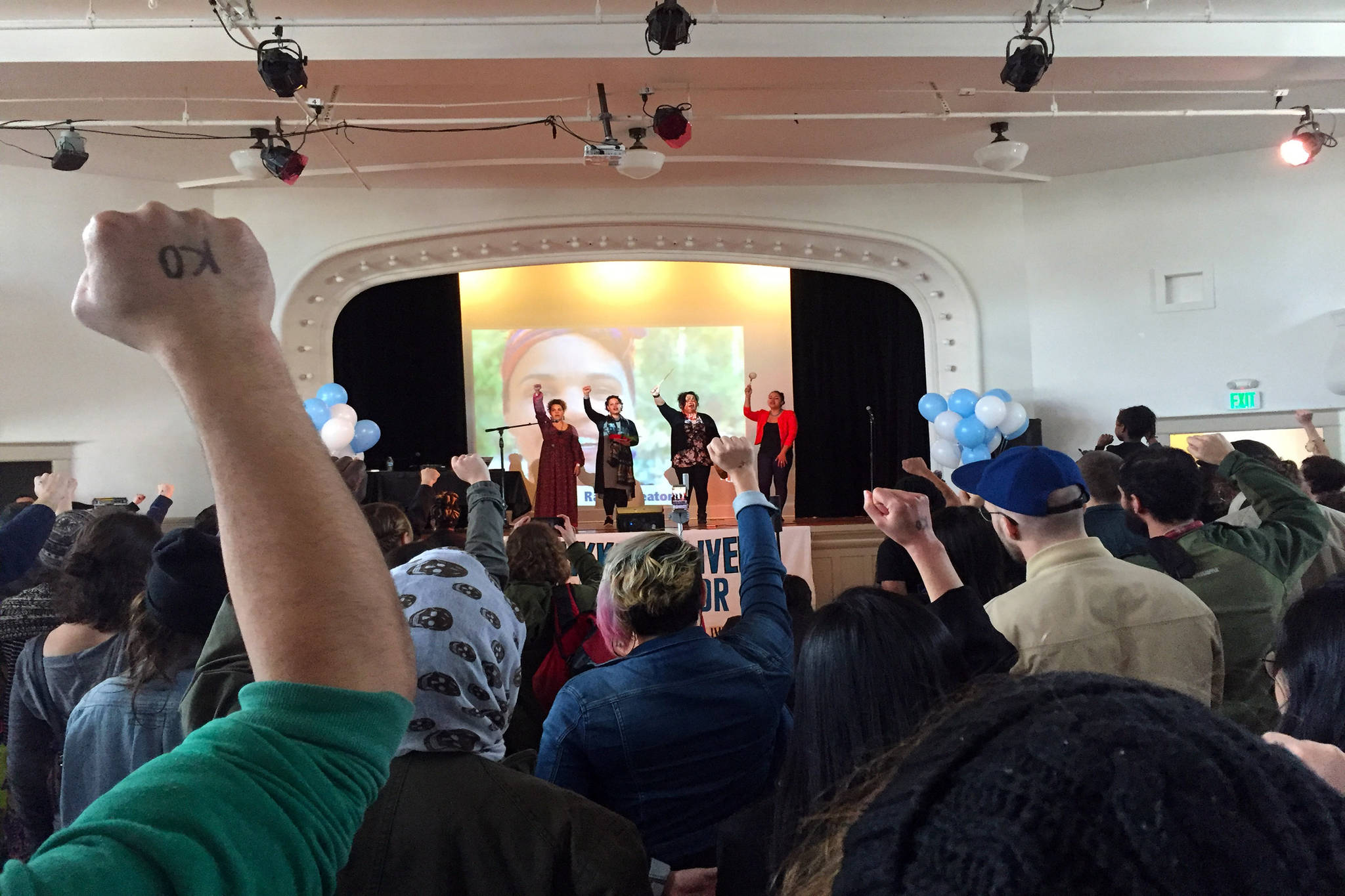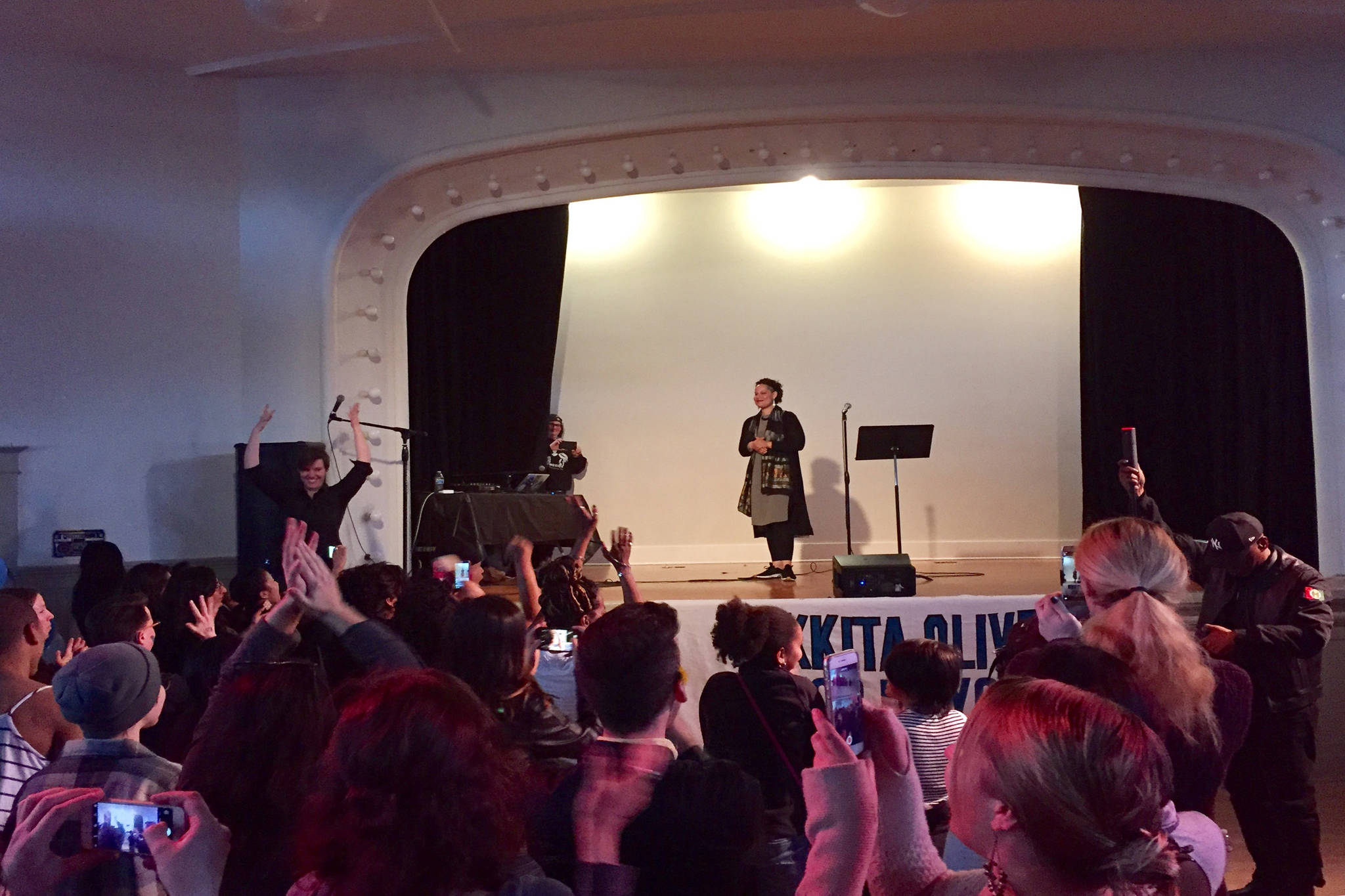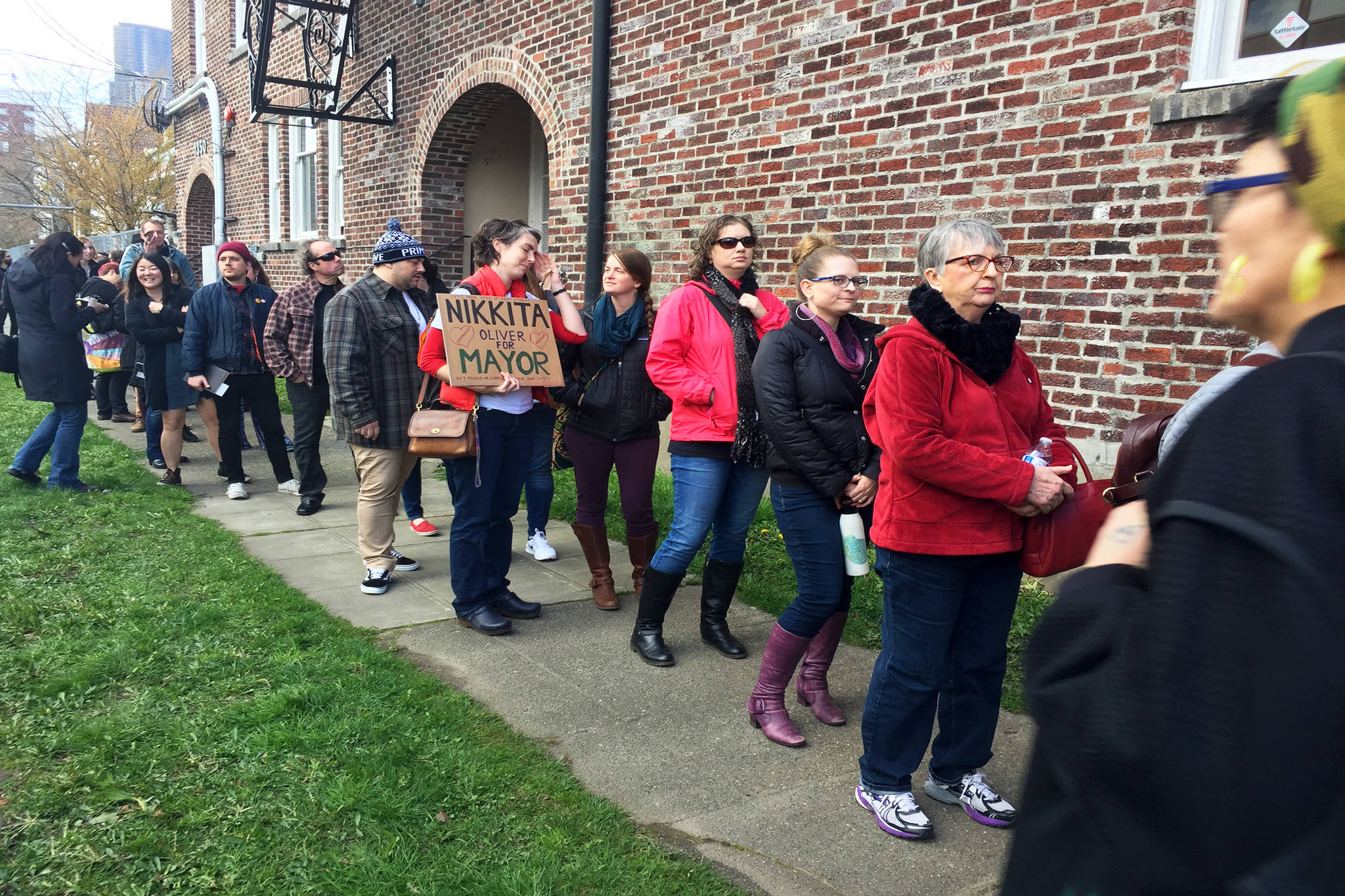Before Nikkita Oliver’s mayoral launch party officially launched on Sunday afternoon, there was already a long line of people wrapped around the Central District’s Washington Hall.
After volunteers marked the backs of their hands with the letters “KO”—a tip of the hat to Nikkita “KO” Oliver, the name the candidate has used as a poet and performance artist—attendees were greeted inside by a bona fide party: a DJ blasting Parliament’s “Give Up the Funk” and a raucous and youthful crowd that quickly packed the place to capacity. (Overflow attendees were encouraged to head to The Station in Beacon Hill, where the event was live-streamed.)
Save a speech by Councilmember Kshama Sawant, the lineup was composed almost entirely of artistic performances by local women of color. Musicians, poets, drummers, and dancers included local rapper DoNormaal, 17-year-old opera singer Jayza Duhon, 19-year-old Leija Farr — Seattle’s first youth poet laureate — and the Northwest Tap Connection, a race and social justice-oriented dance studio whose members also performed at Washington Hall last fall as part of the Black Students’ Lives Matter rally. All received waves of support from an electrified audience that whooped and screamed and pounded the floor with its feet, at times shouting, “Nik-ki-ta! Nik-ki-ta!”
“This is a campaign [party] unlike any other that I’ve been to,” said attendee Felipe Rodriguez-Flores. “I went to a City Council campaign kickoff recently, and it was really awesome, but they didn’t have any artists — let alone an hour and a half of some of the best artists in our community! I think that’s so powerful.”
To some of Oliver’s supporters, who’ve watched her win slam poetry competitions and serve as a writer-in-residence at Washington Middle School as well as co-lead various activist movements, the idea that this candidacy exists at all has just begun to sink in.
“A lot of people are excited that she’s running,” said activist Ahmed Gaya, but the feeling has mostly been, “’Is this real?!’ This is the moment where it becomes real.”
Oliver herself allowed that her candidacy was a shoot-the-moon kind of thing: “I love it when people tell me something is impossible,” she said when she took the stage. “This whole thing, to a lot of people, seems impossible. When I tell people I’m running for mayor, they’ll just go, ‘Oh… isn’t Murray running?’ And I’ll go, ‘Yeah. Yeah,” she said, smiling.
Unseating a well-heeled political incumbent is no small feat, and Mayor Ed Murray heads into this year’s election with cash and decent polling numbers. He’s reported more than $300,000 in campaign contributions so far. And in January, Murray’s approval ratings were at 60 percent. But Oliver is considered Murray’s most significant challenger to date — bolstered now both by Sawant’s endorsement and an engaged activist community that has known her for years.
There are other mayoral challengers, too — eight in total now, including safe streets advocate Andres Salomon, the only candidate besides Murray to so far have posted contributions of more than a few hundred dollars with the SEEC. And there may be at least one candidate coming from the more conservative side of things, at least when it comes to one issue: Peter Alcorn, a Boeing employee who recently announced his campaign. According to his GoFundMe page, he is running on a platform that, among other things, criticizes Murray for risking “every penny” of federal funding rather than alter Seattle’s sanctuary city status. But Alcorn is also an advocate of other ideas, including promoting Housing First as one of the solutions to the homelessness crisis, something that Oliver supported in her speech.
“We are living in one of the most wealthy cities in the United States,” she said. “It’s time we change the narrative of scarcity, to know that there’s enough if only we were willing to share it collectively.” In addition to permanent housing for the city’s homeless, “We will push for rent control,” she promised. And, above all, she wants the city to make sure “affordable housing moves in lockstep with development. We must stop giving developers a free ride.” To that, the room erupted. (Oliver has said that HALA is not a bad thing, but it’s not enough).
Rodriguez-Flores, for one, made a connection between the night’s artistic performances and housing. “A lot of those amazing artists we saw are really having a hard time being in the city,” he said. “This is a city that’s become affordable for the tech sector, and if you’re almost anyone else, it’s like, ‘too bad for you.’ … Being a city that’s as progressive as we are and empathetic and compassionate as we say we are… we need to make sure we have housing policies that reflect that.”
On police reform in Seattle, another of Oliver’s policy priorities, she said, “We have made strides in the right direction, but this sort of transformation is taking too long.” She advocated for “a robust version” of legislation currently before the City Council that would establish, she said, “an expanded and permanent, politically independent community policing commission that has teeth — that has the ability to affect change.”
For many of her supporters, no matter the outcome, the campaign seems a way to push Seattle’s left-leaning establishment (or, as Sawant put it, the “corporate political establishment”) further to the left—and could stand as another example to boost Seattle’s growing national reputation as a beacon of progressive values. One of the hashtags Oliver’s campaign is putting forth is #SeattleLeads, reminiscent of one of the hashtags circulated by anti-Dakota Access pipeline activists during the campaign to get the city to end its relationship with Wells Fargo, a move that attracted nationwide attention: #StartWithSeattle.
Earlier on Sunday, both Oliver and Sawant spoke at the Seattle Socialism Conference. Oliver is not running specifically as a socialist, however, but as a member of the newly-formed Seattle People’s Party.
“I think that in order for us to have an equitable Seattle—and eventually an equitable world—we need to be running politicians like Nikkita Oliver, who aren’t running on corporate money, who are accountable to the communities they are serving,” said attendee Emerson Johnson. “As a socialist, seeing someone run outside of the Democratic or Republican Party is really, really exciting.”
The event was a fundraiser; campaign volunteers said they aimed to raise $25,000 that night, and promised to host 91 house parties between now and November — likely to emphasize the fact that the first and last time a woman was elected as mayor of Seattle was 91 years ago: Bertha Knight Landes, in 1926.










